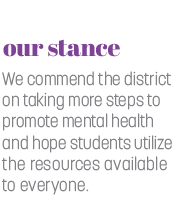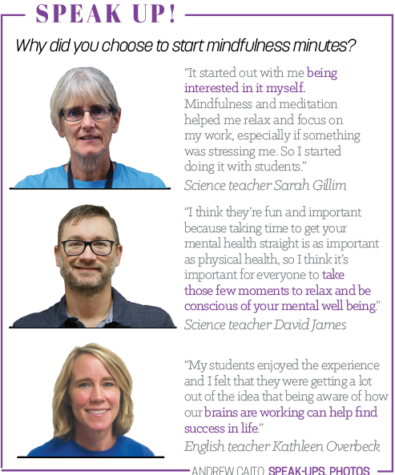In June 2019, the Carmel Clay board of trustees hired the first mental health coordinator in our district, Stephanie Whiteside, to further its initiative of addressing mental health issues among Carmel

Clay students. Whiteside will be responsible for providing critical advice about mental health, supporting counselors and social workers and overseeing the district’s actions in addressing mental health
issues. While the HiLite staff fully commends the school board’s decision to hire a mental health coordinator, we also encourage students to take the services she will oversee seriously.
According to the Centers for Disease Control and Prevention, one-fifth of American children ranging from ages 3 to 17 suffer from a mental illness, but approximately 80% get no treat ment. Although CHS has already implemented programs to combat the issue, such as Mindfulness Minutes and the Culture of Care campaign, the hiring of a professional proves the district is serious in addressing mental health in schools, environments notorious for negatively impacting students’ mental health. In fact, a study conducted by the Pew Research Center in 2019 found that academics are the leading cause of stress correlated to mental illness among teens, followed by fitting social norms and participating in extracurriculars. Thus, with a trained mental health coordinator on staff who possessesextensive knowledge about mental health as well as skills to help address mental health issues, this district has a hopeful future.
ment. Although CHS has already implemented programs to combat the issue, such as Mindfulness Minutes and the Culture of Care campaign, the hiring of a professional proves the district is serious in addressing mental health in schools, environments notorious for negatively impacting students’ mental health. In fact, a study conducted by the Pew Research Center in 2019 found that academics are the leading cause of stress correlated to mental illness among teens, followed by fitting social norms and participating in extracurriculars. Thus, with a trained mental health coordinator on staff who possessesextensive knowledge about mental health as well as skills to help address mental health issues, this district has a hopeful future.
In response to the school’s efforts, however, students need to utilize the new resources, as well as help remove the toxic stigma surrounding mental health issues. According to the Social Science and Medical Journal, school-level stigma is negatively associated with medication use, counseling and therapy visits and to a lesser degree, emotional support. Often, the stigma is present because the students are ignorant about issues surrounding mental health. According to a national survey conducted by Michigan State scholars, 54% of people could not identify

anxiety and 37% could not identify depression, resulting in 71% of people expressing stigma about mental health. Luckily, Whiteside said she plans to increase awareness and educate others on mental health, consequently removing any toxic stigmas or stereotypes that students in the district may believe. We only ask for students to take the school’s actions in addressing mental health seriously, utilize the services provided if needed and be sensitive toward others. From this, the Carmel Clay district can create a positive environment for students and become a safe place for those in need.
Thus, with mental health becoming a more pressing issue on school grounds, the HiLite staff commends the school board for its efforts. We look forward to the plans Whiteside has.
Read a full Q&A with Stephanie Whiteside here

































![AI in films like "The Brutalist" is convenient, but shouldn’t take priority [opinion]](https://hilite.org/wp-content/uploads/2025/02/catherine-cover-1200x471.jpg)










































![Review: “The Immortal Soul Salvage Yard:” A criminally underrated poetry collection [MUSE]](https://hilite.org/wp-content/uploads/2025/03/71cju6TvqmL._AC_UF10001000_QL80_.jpg)
![Review: "Dog Man" is Unapologetically Chaotic [MUSE]](https://hilite.org/wp-content/uploads/2025/03/dogman-1200x700.jpg)
![Review: "Ne Zha 2": The WeChat family reunion I didn’t know I needed [MUSE]](https://hilite.org/wp-content/uploads/2025/03/unnamed-4.png)
![Review in Print: Maripaz Villar brings a delightfully unique style to the world of WEBTOON [MUSE]](https://hilite.org/wp-content/uploads/2023/12/maripazcover-1200x960.jpg)
![Review: “The Sword of Kaigen” is a masterpiece [MUSE]](https://hilite.org/wp-content/uploads/2023/11/Screenshot-2023-11-26-201051.png)
![Review: Gateron Oil Kings, great linear switches, okay price [MUSE]](https://hilite.org/wp-content/uploads/2023/11/Screenshot-2023-11-26-200553.png)
![Review: “A Haunting in Venice” is a significant improvement from other Agatha Christie adaptations [MUSE]](https://hilite.org/wp-content/uploads/2023/11/e7ee2938a6d422669771bce6d8088521.jpg)
![Review: A Thanksgiving story from elementary school, still just as interesting [MUSE]](https://hilite.org/wp-content/uploads/2023/11/Screenshot-2023-11-26-195514-987x1200.png)
![Review: "When I Fly Towards You", cute, uplifting youth drama [MUSE]](https://hilite.org/wp-content/uploads/2023/09/When-I-Fly-Towards-You-Chinese-drama.png)
![Postcards from Muse: Hawaii Travel Diary [MUSE]](https://hilite.org/wp-content/uploads/2023/09/My-project-1-1200x1200.jpg)
![Review: "Ladybug & Cat Noir: The Movie," departure from original show [MUSE]](https://hilite.org/wp-content/uploads/2023/09/Ladybug__Cat_Noir_-_The_Movie_poster.jpg)
![Review in Print: "Hidden Love" is the cute, uplifting drama everyone needs [MUSE]](https://hilite.org/wp-content/uploads/2023/09/hiddenlovecover-e1693597208225-1030x1200.png)
![Review in Print: "Heartstopper" is the heartwarming queer romance we all need [MUSE]](https://hilite.org/wp-content/uploads/2023/08/museheartstoppercover-1200x654.png)



